39 role of private labels in retail
What is Private Labeling? [Definition, Pros, Cons & More] As a retailer, you have control over every part of your private label line. You can define the ingredients or components. You can control things down to the color and shape of the product. You control how the product is branded and marketed, too. When you sell branded products, people aren't becoming loyal to your company. The potential for powerhouse Private Brands: an updated view Even as retailers have introduced new private-brand products and brands over the years, few have thought through the role of private brands in their businesses. Some private brands and products come into being simply because, for instance, a vendor offers to make a product at a lower cost and higher margin than a national brand.
4 Benefits of Private Labeling for Your Brand - Century Label Private label products use the retailer's private label brand. It is up to the end retailer to design the manufacturing, packaging, and marketing - not up to you as the creator of the good, eliminating added costs. You only pay the product cost without a premium for brand name or expensive marketing campaigns. Lower Operating Costs
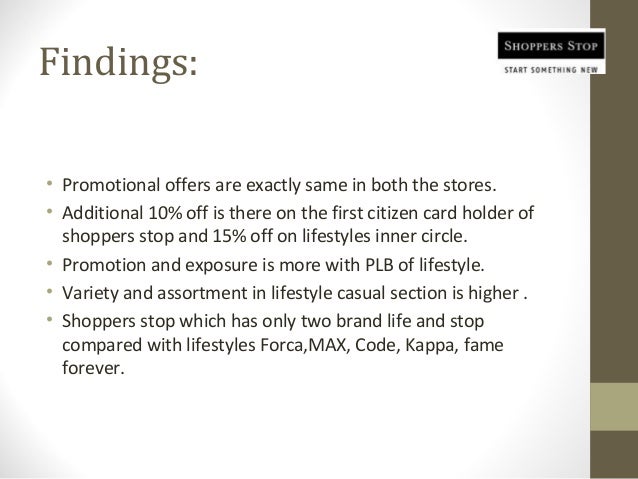
Role of private labels in retail
Private Label Brands Roar At Retail - Forbes Overall, private labeling is a positive trend, although, as with everything, there will be winners and losers. It helps manufacturers who need capacity, creates loyalty for retailers who can get... Brands Versus Private Labels: Fighting to Win In supermarkets, for example, private labels have developed well beyond the traditional staples such as milk and canned peas to include health and beauty aids, paper products such as diapers, and... Private labeling: Process, Advantages, and Disadvantages Following are the few things that you should keep in mind while designing a private labeled product #1 Price and customer loyalty: It is important to make sure that the products that you are private labeling are profitable for you. Otherwise, it would be better for you to invest in buying the products of some well-established brand to avoid loss.
Role of private labels in retail. Private Labels: Their growing importance in Retailing - ISME Bergès-Sennou et al [2004] cite a survey by LSA/Fournier1 according to which the main reasons retailers develop private labels are: to increase customer loyalty (16%), to improve their positioning (18%), to improvemargins (25%) and to lower prices (33%). Figure 1 Indian retail industry has seen some ups and downs over the past. The Growth of Private Label Food Brands Private Label Growing in All Channels. According to the PLMA, "private-label sales grew 2.5% in 2014, versus 1.1% for national brands." A Wells Fargo analyst John Baumgartner reports Kroger's projection that its Simple Truth private label brand, now at approximately $1.2 billion in annual sales, may double in the next few years. 3 Reasons Why Retailers Are Introducing Their Own House Brands - DotActiv House brands or labels, also known as private labels or retailer brands, are nothing new to the retail industry. Even though private label programmes were deemed unpopular in the past, today we are seeing a global shift in consumers' loyalty from manufacturers' brands and labels to retailers' own private brands and labels. The future of Private Brands and its Role in Retail Private Label quality continues to improve beyond its sales growth. Retailers & Private Label manufacturers should leverage its strengths
Private Label Definition - What is Private Label A private label product is manufactured by a contract or third-party manufacturer and sold under a retailer's brand name. As the retailer, you specify everything about the product - what goes in it, how it's packaged, what the label looks like - and pay to have it produced and delivered to your store. This is in contrast to buying ... 26 Private Label Products That Actually Sell (2022) - Zyro Blog The overall sales of private label milk and dairy products in the US is $7.5 billion . Over 90% of Aldi's North American food sales are made through selling private label products. In 2020, 82% of US consumers surveyed said they thought that supermarket brands offered better value for money than private brands. Private labels: The role of manufacturer identification ... - Emerald The purpose of this paper is to analyze product, retailer, and individual factors from the private label brand that influence consumers' loyalty and purchase intention; along with the influence of the manufacturer identification on the product package on purchase intention. Design/methodology/approach retailing-private label - SlideShare • Private Labels are Retailers own, control, and exclusively sell store brands • Private Label are a 'Good Alternative' to Other Brands, Offering the Same Quality & Value • Private labels are regarded as good Value for Money, and Quality on Par with the Big Brands. 3.
Private Label : Definition, Example, Pros & Cons | Retail Dogma Private label is a concept in retailing, where a retailer contracts a third-party manufacturer to manufacture their products under certain specifications, and under a brand name that belongs to the retailer. A lot of retailers who sell multi-branded products in their store sometimes opt to private label part of their product offering to realize ... Private label - Wikipedia A private label, also called a private brand or private-label brand, is a brand owned by a company, offered by that company alongside and competing with brands from other businesses. [1] [2] A private-label brand is almost always offered exclusively by the firm that owns it, although in rare instances the brand is licensed to another company. [3] The role of private label tiers and private label naming strategies in ... The evolution of private labels (PL) is a recent trend in the retail industry: many retailers now manage a PL portfolio that includes multiple value propositions, as well as various brand name strategies. Little research has been done, however, on how this combination of PL strategies conditions the results of the retailer that manages them. The battle for brands in a world of private labels - Deloitte Insights private labels represent 20 percent of grocery store and 18 percent of supercenter sales. 4 furthermore, store brand products were 31 percent cheaper across product categories than their national brand counterparts. 5 store brands are not just a recession related phenomenon - u.s. store brand sales continue to grow over the long run despite …
Is Private Label Merchandise Right for Your Retail Store? If you are a retailer who matches prices, private-labeled goods provide a great benefit. In many cases, you can get your supplier to make you the same product, but without their label on it. Then you can still charge full price for your product when your competition puts the branded version on sale.
Private Brand Definition - Investopedia Private Brand: A brand placed on products that a large manufacturer has created for a smaller retailer. The smaller retailer places their own private brand label on the final good which was ...

36 What Is An Advantage Of Selling Private-label Brands For A National Retailer? - Label Design ...
Turning private labels into powerhouse brands - McKinsey Even as retailers have introduced new private-label products and brands over the years, few have thought through the role of private labels in their businesses. Some private-label brands and products come into being simply because, for instance, a vendor offers to make a product at a lower cost and higher margin rate than a national brand.
The role of retail market power and state regulations in the ... Higher retailer market power causes retail prices of private label milk to rise faster and to fall slower. The existence of a state pricing regulation slows down the adjustment speed of retail prices of private labels back to the long-run equilibrium, regardless of whether the retail price is low or high. Citing Literature
Premium private label: how product value, trust and category ... Premium private labels (PPLs) are applied to products with distinctive features with prices equal, and sometimes even higher, than those of the category leaders. The objective of the retailers is to obtain, in the minds of consumers, the same positioning of national brands.
Private labels - SlideShare Since private labels are unique to one retail chain, there is the possibility for retailers to cultivate a sense of brand loyalty. By nurturing customer loyalty, retailers can have significant advantage over its competitors. ... Local politics plays a big role in setting up ventures. 37 38. ECONOMIC FACTORS Inflation: Due to inflation the cost ...
Private Label Brands Surge As Consumers Purge Closets - Forbes Private labeling was already a staple of big-box retailers before the pandemic, for retail giants like Walmart and Target, and for major niche players. In 2018, Urban Outfitters reported that over...
Private Label is a Winning Strategy for Retail Success The reason lies in the fact that private label products are exclusively available in the store that produces them. Agility to respond to trends - Agility relates to fast response and flexibility. Since retailers have greater control over their brands, they can innovate and change faster.
Private labels and the specific retailer's role - IDEAS/RePEc Private labels (or own-brand products) play a prominent role for consumers in their perception of retailers' reputation. In a model where products are experience goods, a retailer has the opportunity to introduce his own store brand, or to sell a branded product.
Private labeling: Process, Advantages, and Disadvantages Following are the few things that you should keep in mind while designing a private labeled product #1 Price and customer loyalty: It is important to make sure that the products that you are private labeling are profitable for you. Otherwise, it would be better for you to invest in buying the products of some well-established brand to avoid loss.
Brands Versus Private Labels: Fighting to Win In supermarkets, for example, private labels have developed well beyond the traditional staples such as milk and canned peas to include health and beauty aids, paper products such as diapers, and...
Private Label Brands Roar At Retail - Forbes Overall, private labeling is a positive trend, although, as with everything, there will be winners and losers. It helps manufacturers who need capacity, creates loyalty for retailers who can get...


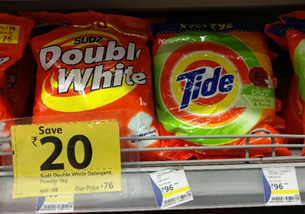




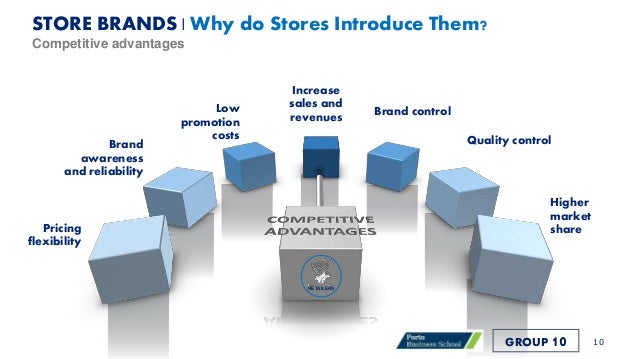


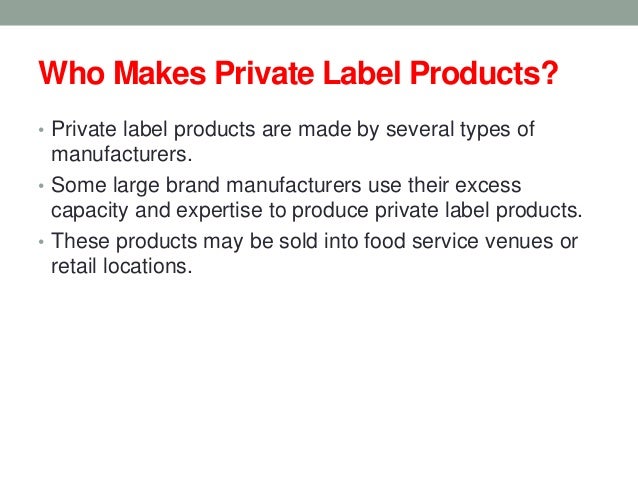
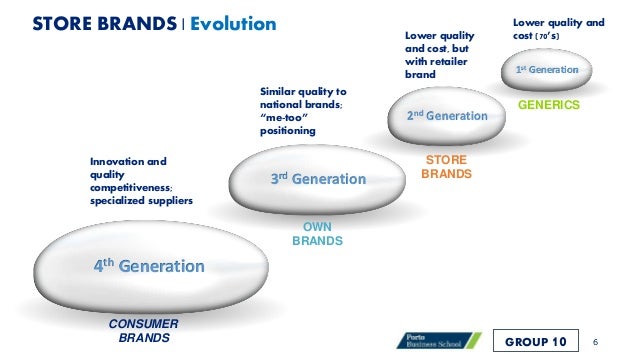

Post a Comment for "39 role of private labels in retail"